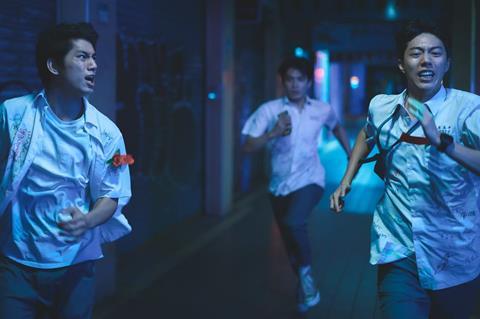Three Taiwanese high school graduates embark on a night of increasing peversity in Kai Ko’s directorial debut

Dir. Kai Ko. Taiwan. 2022. 77mins
A high school graduation celebration takes a nasty turn in actor Kai Ko’s directorial debut Bad Education. Taking place over one night, it focuses on three friends who realise that finding your life at a crossroads is no excuse for going over the line in terms of social behaviour. Bad Education isn’t the first ‘one crazy night’ film from Taiwan, the trope having been employed in such tonally diverse nocturnal misadventures as Parking (2008), Au Revoir Taipei (2010) and One Night Only (2016). Yet it’s by far the darkest of the bunch, with some gallows humour that is simply beyond the pale. This jet-black comedy may be concise in narrative, but it’s arguably excessive with regards to its relentlessly cynical attitude and questionable depictions of transgressive impulses.
For all the qualities on display, the troubling presentation of sexual assault in ’Bad Education’ means that Ko fails to ace his first behind the camera assignment.
Releasing in Taiwan in March of this year, Bad Education had its international premiere at the Udine Far East Film Festival and continues its tour of the festival circuit with a berth at Buncheon International Fantastic Film Festival. It should certainly attract attention as the first feature from Ko, who has steadily rebuilt his career after a 2014 drugs arrest by taking challenging roles in such auteur projects as Midi Z’s The Road To Mandalay (2016) and C.B. Yi’s Moneyboys (2021). (Z serves as an executive producer here, while the screenplay was penned by Ko’s frequent collaborator Giddens Ko, who had initially planned to direct.) Despite its unpleasant streak, the combination of high-profile talent and the continued appeal of cruel stories of youth from East Asia makes Bad Education a viable candidate for a limited international theatrical release with streaming potential down the road.
Chang (Berant Zhu), Han (Edison Song) and Wang (Kent Tsai) are introduced on a rooftop, where they are drinking the night away after graduating from high school. Seeking to forge a lifelong bond, Chang proposes they share their darkest secrets. He promptly tells a story involving sexual deviance, which is followed by Han’s confession of murder. But when Wang is unable to offer anything similarly shocking, Chang insists that he compensates by assaulting a gangster (Mcfly Wu) he has spotted on the street below.
Chang and Han expect their friend to chicken out, but Wang actually smashes a beer bottle over the gangster’s head. With a gang of furious hoodlums in hot pursuit, the trio flee through the streets and back alleys. Before the night is over, they come into contact with a taxi driver (Cheng Chih-wei) and his inebriated female passenger (Chang Ning), a pair of cops (Huang Hsin-yao and Liu Chu-ping), and fearsome underworld figurehead Brother Hsing (Leon Dai).
Events are structured in three chapters, of which the second (’Good Folks’) is the most dynamic as the youths go on the run; playing up their clumsiness in an escalating situation means that it’s more scrappy than kinetic. Nonetheless, editors Huey Lee and Meng-Ju Shieh make sure that the extended chase is judiciously paced with cinematographer Chen Ta-pu covering the chaos in a tactile manner that recalls his terrific work on Yee Chih-yen’s teen heist caper Salute! Sun Yat Sen (2014).
By comparison, the first chapter (’Monkey’) and third (’Bad Folks’) have a more theatrical quality, as they take place in single locations (the rooftop and the seafood restaurant which serves as Brother Hsing’s front). Chen’s sharp camera angles and striking production design by Sunny Wu Jo-yun, which emphasises garishly foreboding red neon signage, ensure that the set-up is sufficiently eye-catching while building palpable intensity in the denouement.
The fresh-faced leads acquit themselves well as three distinct types: the ringleader (Chang), the enabler (Han) and the innocent (Wang). Indeed, the collective strength of their performances is how they indicate the cracks beginning to form in their characters’ friendship based on economic background and academic aptitude, which cause irreparable damage in the third chapter when they receive their ‘bad education’. It’s also in this chapter that veteran performer Dai delivers a masterclass in intimidation as a gangster-cum-restaurateur who made his share of juvenile mistakes and is now responsible for serving up etiquette lessons with a side order of severity.
For all the qualities on display, the troubling presentation of sexual assault in Bad Education means that Ko fails to ace his first behind the camera assignment. The two offending sequences are seemingly played and framed for crude laughs, with one of the victims tastelessly used for comic relief while her ordeal is made light of. These gross misjudgements could be taken as a particularly unfortunate example of a first-time director as wannabe provocateur, but are downright inexcusable when Ko is working under the auspices of Giddens Ko and Midi Z. The ensuing sense of revulsion entails that Bad Education is a tough ‘night out’ to recover from – but not for the reasons that its creators had presumably intended.
Production companies: Harvest 9 Road Entertainment, Machi Xcelsior Studios, Seashore Image Productions
International Sales: Harvest 9 Road Entertainment, sanling.chang@gmail.com
Producer: Molly Fang
Screenplay: Giddens Ko
Editing: Huey Lee, Meng-Ju Shieh
Cinematography: Chen Ta-Pu
Music: Wong Kin-wai
Main cast: Kent Tsai, Edison Song, Berant Zhu, Leon Dai






![The Brightest SunScreen[Courtesy HKIFF]](https://d1nslcd7m2225b.cloudfront.net/Pictures/274x183/3/5/0/1448350_thebrightestsunscreencourtesyhkiff_312678.jpg)














![The Brightest SunScreen[Courtesy HKIFF]](https://d1nslcd7m2225b.cloudfront.net/Pictures/100x67/3/5/0/1448350_thebrightestsunscreencourtesyhkiff_312678.jpg)












